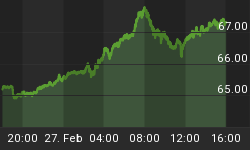It was an exciting and educational week. I was in Vancouver at the Agora Financial Investment Symposium speaking to hundreds of investors who are eager to learn how to grow and protect their wealth. This year's theme, "Innovate or Die," fit well with my presentation, as the conference challenged attendees to adapt their investment strategies just as empires and enterprises adjust to changing circumstances.
When I wasn't behind the podium, I sat with the audience, soaking up new ideas from speakers, including Gloom Boom & Doom Editor Marc Faber, historian Niall Ferguson and Editor of Outstanding Investments Byron King, who surprised me and challenged my current way of thinking.
Back at the office, our analysts and portfolio managers continue their daily meetings as always to discuss and digest the mountains of research that cross our desks each day. We question what we read, analyze statistics and hypothesize on what we see happening across the global economy. As much as emotions and biases take a role in investing, our goal is to make decisions not based on groupthink that discourages creativity, but founded on a collective wisdom that encourages critical evaluation of the economy and markets.
Global investors constantly need to be watchful of individual biases, impaired thinking and emotional reactions that can have an adverse effect on a portfolio. That's why we created this weekly Investor Alert which thousands of readers have come to rely on. One of our values at U.S. Global Investors is to always be curious to learn and improve, and the Investor Alert was borne from a belief that shareholders want to understand the very subtle nuances of biases and misconceptions.
My presentation attempted to address a few cognitive dissonances I see in the markets these days and I was pleased to have several attendees approach me afterward, remarking how they thought differently after seeing the slides.
See previous presentations and be surprised.
As much as I'd love to share all of the visuals here, in the interest of space, I selected only a few that I believe challenge the paradigms of investing.
1. For all the hype over recent tech initial public offerings, did you know that investors have lost more money in Groupon and Facebook than the entire assets in all of the gold funds? With the endless coverage leading up to Groupon and Facebook's IPO, the stocks appeared to be positioned to the public as a mainstream investment. However, I believe people were unaware of the risks involved when they purchased shares.
As you can see below, since its price peak on November 4 through July 26, Groupon has lost $15 billion in market capitalization. Facebook has lost even more in dollar value in a shorter amount of time: From its intraday high on May 18 through July 26, the market cap of the company has dropped $34 billion. These losses pale in comparison to all the money invested in gold funds in the U.S. combined.

2. Did you know that the overall market has historically been more volatile than gold? Take a look at the rolling 1-, 3- and 12-month volatility for the S&P 500 Index, Bank of America stock, gold bullion and gold equities. As with any investment, price action over the short term can rise and fall, but what surprises many investors is that gold has had less rolling volatility than the overall market, gold stocks and a big bank stock like Bank of America (BAC). In fact, looking over the past five years, BAC has seen more volatility than gold, the overall market and gold stocks!

3. While Warren Buffett bashed gold, did you know that Berkshire Hathaway has underperformed the metal over the last 10 years? Gold has been on an incredible bull run over the past decade, and while Berkshire Hathaway kept pace for the first six years, it has struggled to maintain gold's rise since 2006. In his last shareholder letter, Buffett dismissed gold, comparing the rise of the yellow metal to the tulip mania in the 1600s and claiming that gold only "enjoys maximum popularity at peaks of fear."

As long as I've been in this business, there have been naysayers who question the inclusion of gold in portfolios. However, because the precious metal typically is not highly correlated with other financial assets, holding a small allocation--5 to 10 percent--in a traditional portfolio of stocks and bonds has historically added diversification and reduced volatility.
4. In today's low yield environment, did you know that inflation causes investors of Treasuries to lose money? Treasuries are seen as a "safe haven" investment, but as of the middle of July, the 10-Year Treasury had fallen to less than 1.5 percent. Yet inflation burns off at a rate of 1.7 percent. This leaves investors with a loss of about 0.2 percent. I believe better opportunities exist.

As I've discussed recently, there are plenty of dividend-paying resources stocks with yields much higher than the 10-year Treasury, as well as municipal bond funds that have a higher 30-day SEC yield on a tax-equivalent basis than long-term Treasuries.
Always Be Surprised
Among the millions of people around the world who will watch London's Olympics, many will stay glued to their flat screens to see firsthand the element of surprise. We want to see the rising star who was considered the underdog, the athlete who takes a record number of gold medals or the team that pulls off an unexpected win. These are memorable moments in the making, like track and field star Jesse Owens, who changed history when he overcame adversity and infuriated the Nazis when he won four gold medals during the 1936 Games. Just like the Olympics, I encourage investors to always stay curious and watchful because you never know where the market's opportunities will be.
The following securities mentioned were held by one or more of U.S. Global Investors Funds as of 6/30/12: Market Vectors Gold Miners ETF















